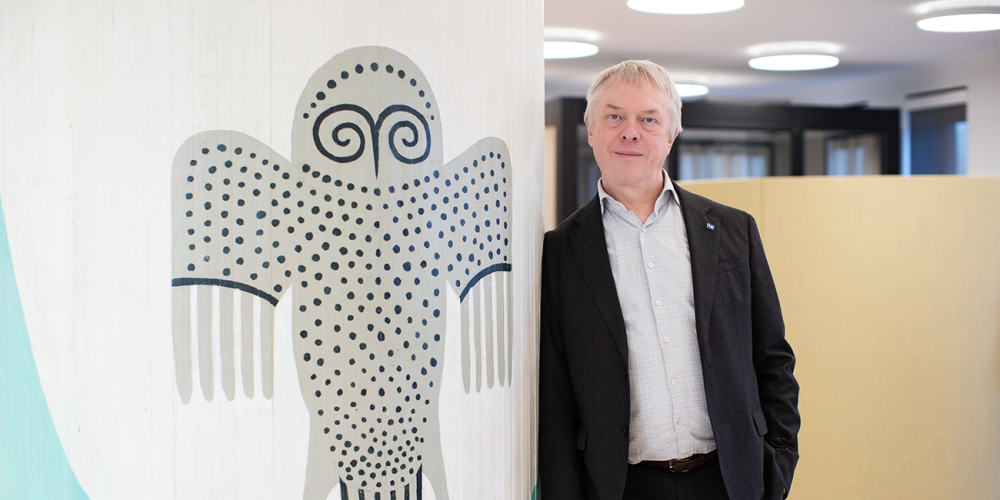
In his speech at the academic opening, rector Jan Danckaert spoke about the dark times we live in, a feeling many people share. As the rector of a university in Brussels, working in education and science, those times must feel particularly heavy. “The cuts announced in the Flemish government’s September Declaration make me deeply concerned, not to say shocked,” Danckaert says. “Brussels’ higher education institutions are hit disproportionately hard. For VUB, this means an additional cut of around 10 million euros from 2026 onwards, on top of the cuts we were already facing — another 10 million spread over three years. I am very worried about the Flemish government’s plans and how we will be able to finance our university in the future. As for the state of the world, and what a university can contribute for the better, I remain cautiously optimistic.”
Reflecting on the state of the world, Danckaert turns to a quote from the turbulent 1960s: “Martin Luther King said in 1968: The world is all messed up, the nation is sick, trouble is in the land, confusion all around.” It could just as well describe today. And yet, we often see 1968 as a time of renewal — revolution even — with young people fighting for greater freedom.
“And maybe that is happening again now,” the rector suggests. “Polarising forces are at work. That was the case back then too. I’m not a historian, but during the fight for the civil rights of Black Americans and for women’s rights in the 1960s there was a great deal of polarisation. Today we see the same thing happening around different social issues. In that context, as a university, as an institution, and as a product of the Enlightenment, you must clearly state what you stand for. That is why our values are so important.”
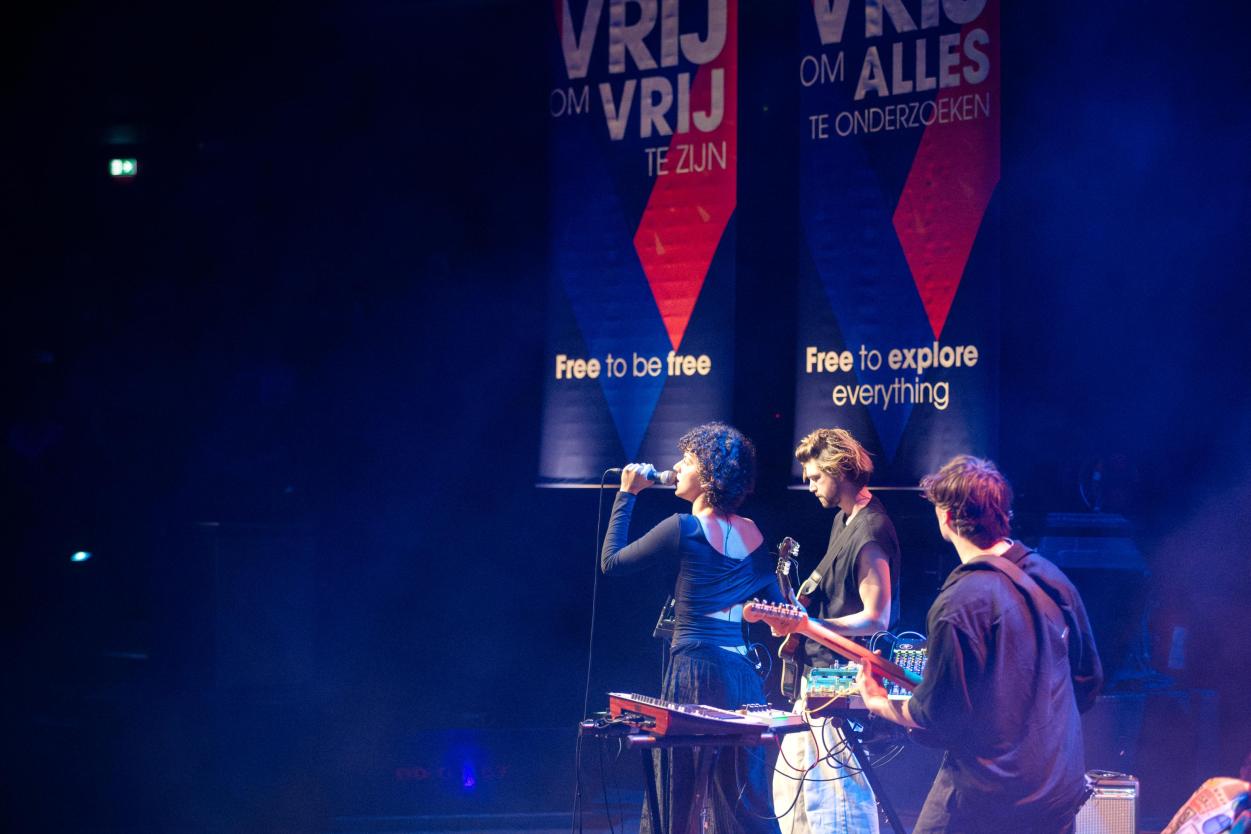
Academic opening 2024: Celebration of the Open Mind
“The theme of last year’s academic opening, which for me was an important milestone, was tellingly free spirits. Before that, we held the academic opening together with our EUTOPIA partners in the European Parliament. The alliance started with 6 universities, and now we are 10. There I argued for a new renaissance: when you are in a period of transition, not knowing where you are headed, you have to fall back on your values. Values are your compass. Among them are European values, which are essentially Enlightenment values: curiosity, openness, connection. They are not coincidentally also the driving forces of our research and teaching today.”
Danckaert has even become chair of EUTOPIA, underlining VUB’s leading role in the alliance. “From the very start of the European initiative on university alliances, together with my predecessor Caroline Pauwels, we deliberately chose to be an active part of it. The alliances are helping to reform the European higher education landscape. Where Erasmus has mainly enabled individual student exchanges — valuable, but without much impact on the institutions themselves — the alliances create structural cooperation. Within EUTOPIA we work with Connected Communities: groups of lecturers, researchers, students and external partners who jointly develop teaching material, set up courses or summer schools, or bring students together in hackathons. In this way, students gain a European dimension in their education, often without having to go on exchange. That makes the model more inclusive.
Our administration and support services are also working together at European level, which means the alliance is transforming our university from within. The ultimate goal is that a student enrolled at university A within the alliance is automatically recognised as an internal student at university B. They can then follow courses there that count towards their degree — as long as they are relevant. The same principle applies to research: we want to share infrastructure, becoming more efficient and stronger as a result.”
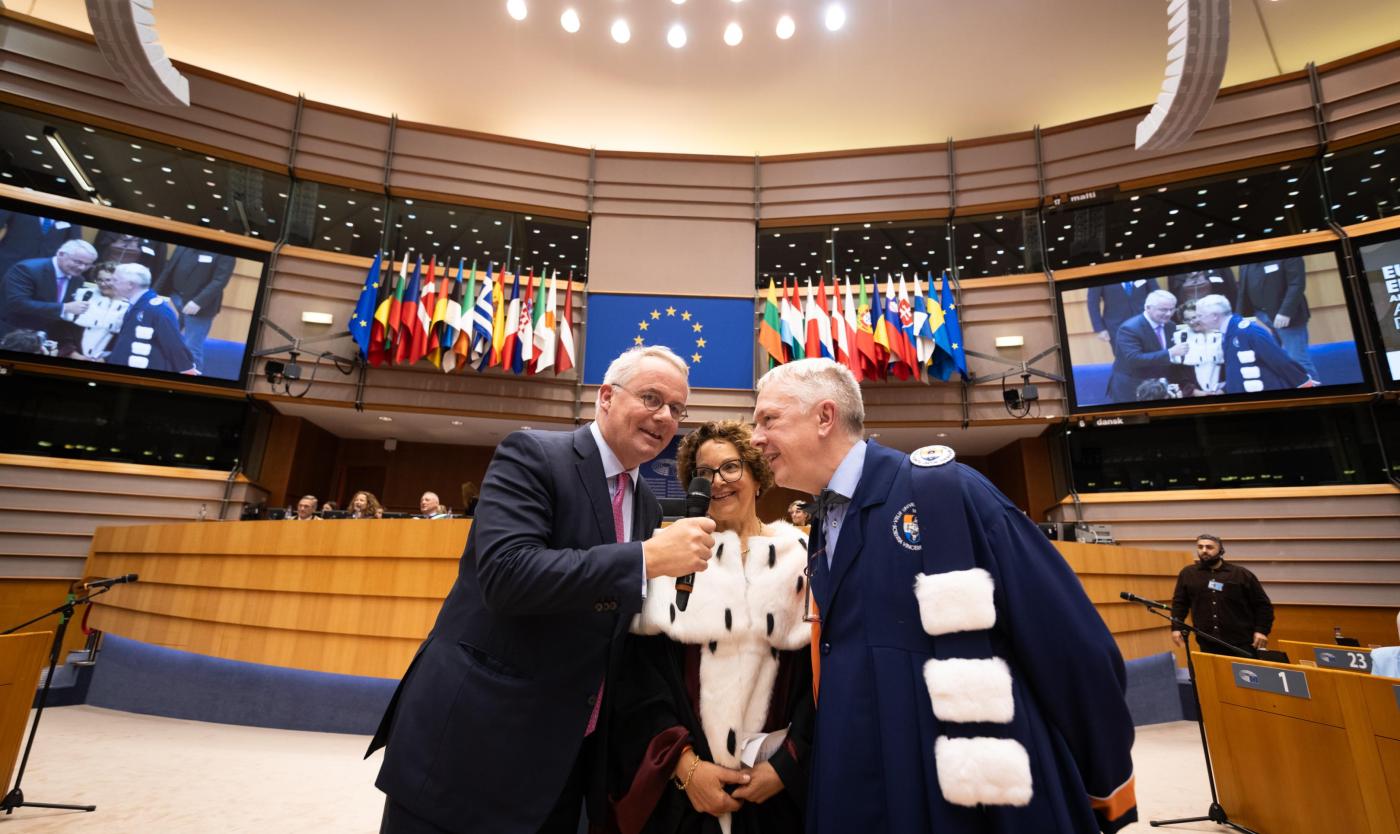
Academic opening 2023: In the presence of our EUTOPIA partners
“We are not alone in striving for enlightenment,” Danckaert insists. “In the United States we see researchers’ freedom under pressure, with threats to withdraw funding or tax benefits… On the other hand, this is prompting stronger European unity. In May, French president Macron organised a summit on scientific research — I would even say free research — precisely the principle Europe should stand for. Europe now wants to add a so-called fifth freedom to its framework: the freedom of science and education. (The other European freedoms are the free movement of goods and services, of people, and of capital, ed.) To be clear: this has not yet happened. But Europe is returning to its core values, sometimes with a double voice, granted. It is then up to universities to keep pointing to them.”
“The core tasks of a university, however, have not changed: to provide education based on the most recent and best scientific insights of the time. We must keep building science, through research that is free in the sense of unbound, but not free of values. As a university we want to have an impact on society. It is our duty to be a beacon of light and enlightenment in society. Universities are lighthouses, guiding the way. Our role has not changed, it has only become more urgent and more crucial. So yes, we are optimistic — but it is conditional optimism, and it comes with a call to action.”
But teaching and research cost money. VUB keeps growing year after year. By the academic year 2025-2026, the university will reach the milestone of 22,000 students in state-funded programmes. The funding has long been problematic. “In about twelve years, our student numbers have almost doubled, and our research activity has also grown. Unfortunately, this growth was not matched by resources. Partly this was due to the government’s eagerness to cut costs, which we could, to some extent, understand. Funding is tied to certain parameters, and sometimes indexation was skipped. At the same time, our expenses kept rising, due to growth on one hand, and inflation and soaring energy prices on the other. We are on a growth trajectory, which makes us proud. But sadly, we are on a savings trajectory as well.”
“What is happening now is of a different order altogether… Due to the budget measures announced by the Flemish government in the September Declaration we lose, on top of the roughly 10 million euros of savings we were already working on, yet another 10 million. To start with, the so-called Brussels funds disappear, cutting around 5 million euros annually from 2026 onwards. Every year, not just once. In addition, a ceiling will be introduced for the funding of non-EEA students (European Economic Area, ed.): only 2 percent of those students will still receive funding. For VUB, with relatively many non-EEA students, that means a loss of an estimated 2 to 3 million euros. Finally, the management agreement with the Institute for European Studies will be terminated, another annual loss of 2.2 million euros — just when the IES was performing excellently in research.”
“We had already begun looking at how we could deploy our support staff more efficiently, which would save us 5 million euros. At the same time, we hoped to find another 5 million in our operational budget. I honestly don’t know how we can make this additional effort on top of that.”
“It looks like we will have to swallow the same scenario as in previous years — we keep growing, but funding keeps shrinking — for quite some time. That is why the governance reform is so important. It allows us to move towards more efficient internal structures, while maintaining a sufficient critical mass. We must ensure our resources are not spread too thinly across large, medium and small entities.”
“The necessary scaling-up has already taken place. We have gone from roughly 150 research groups to around 80. That is still more than enough — in a research landscape, diversity is no bad thing. The scaling-up has paid off. There are excellent examples of groups that have grown interdisciplinarily to another level, such as the House of Sustainable Transitions, the water and climate research group, and FACT — the Flanders Alliance for Climate Technology. Thanks to this scaling-up we can support these groups better, while they, at the same time, gain more impact.”
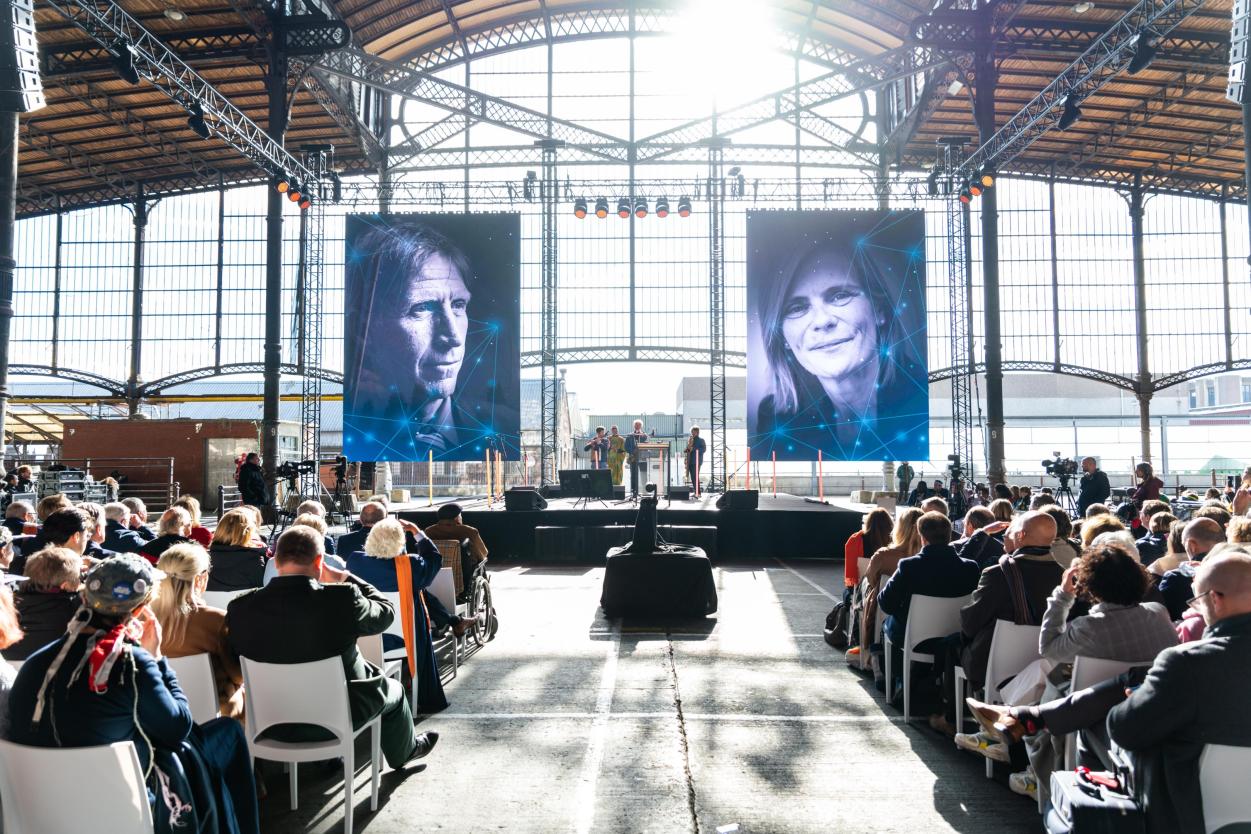
Academic opening 2022: In the market hall of Abattoir
The university’s growth is mirrored in a rising number of top research facilities. That is why this year’s academic opening focuses on the campus. “Open mind. Open science. Open campus.” Our campuses — the two main ones, VUB Main Campus Etterbeek and the Health Campus in Jette — are always open. Anyone can walk in and out, 24/7. You can even bring your dog for a walk. After more than ten years of holding the ceremony elsewhere, we are returning to our alma mater. Hosting the opening off-campus was always a statement: VUB is connected with society. We went to Bozar, the Abattoir slaughterhouse site in Anderlecht, the European Parliament, the Royal Circus, to name just a few. Now we felt it was time to bring the outside world back to our campus. In recent years — thanks also to my predecessors, Caroline Pauwels and Paul De Knop — we have developed a great deal of innovative research infrastructure.
At the intersection of education and innovation stands the brand-new Learning and Innovation Centre (LIC), which provides the learning environment students of the 21st century expect, supported by cutting-edge technology. The LIC is literally a link between VUB and ULB: between the two campuses, the two language communities, the two universities. On the site of the old Van der Meren student housing, a research valley is now rising, complete with operational research facilities. We have installed a cryo-electron microscope for biotechnological research, as well as a bio-incubator that will help build an ecosystem of university labs and companies. There is also CEMAS, the Centre for Martial Arts and Science, where people can practise martial arts — but which will also serve as a laboratory. Through martial arts we can attract young people from vulnerable backgrounds to our campus, and with research on social inclusion and discipline in sport, give them a chance to claim a place in society. Sport as a tool for social promotion and integration. Here too, we highlight our bond with society.
Earlier this year, following the election of US president Trump, Danckaert drew international attention by calling on American researchers to come to Europe to pursue their work in freedom. That call has already led to some concrete results. “When research freedom came under pressure in the US, I received extensive international media coverage. Afterwards, around a hundred American researchers contacted us to explore opportunities in Europe. Specifically, three leading researchers have submitted ERC Advanced Grant applications with VUB as their host institution. That is a first for us. At the same time, of course, our own researchers are applying as well — we cannot reserve opportunities only for Americans. We are working with private foundations to secure additional funding for more research projects. This fits perfectly with the European Commission’s ambition to make Europe attractive as a research destination: here funding is now competitive, and researchers have the freedom to choose their own topics.”
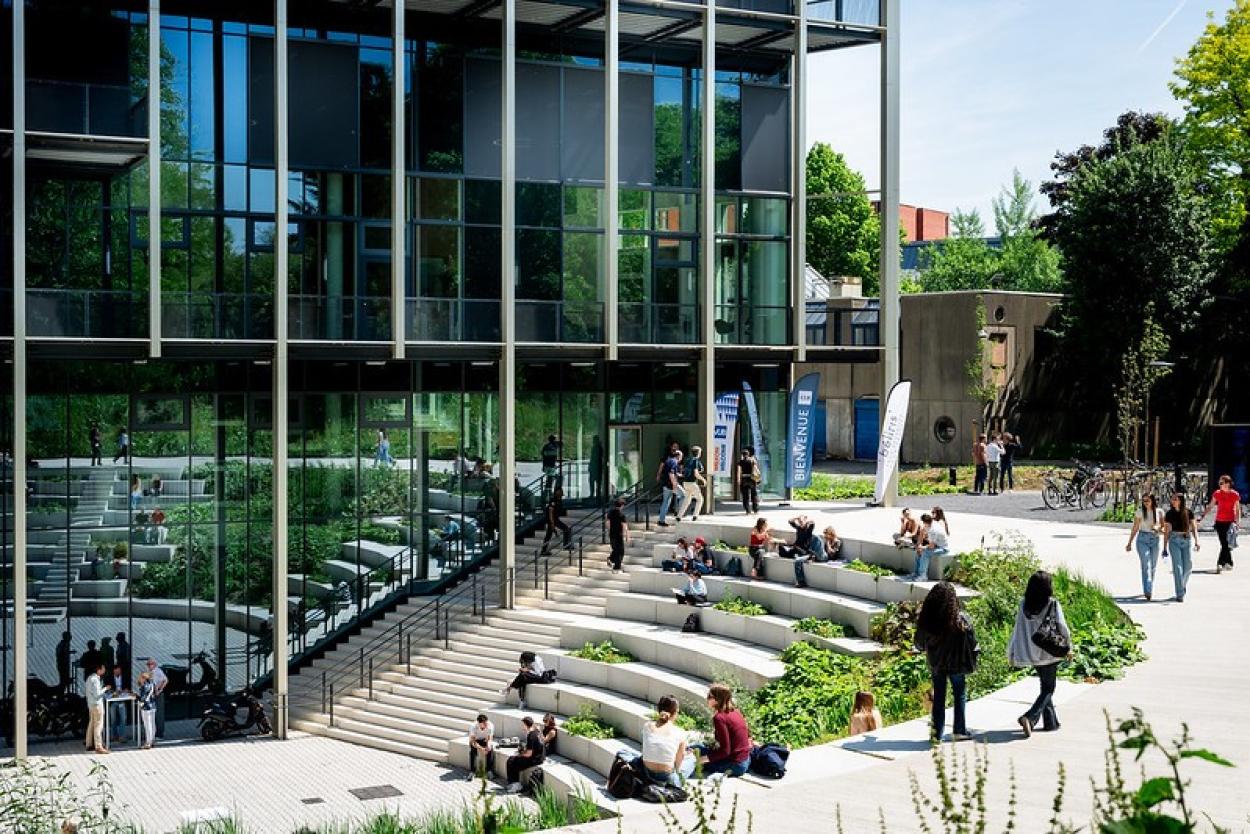
The brand-new Learning and Innovation Centre (LIC)
Another sensitive issue is Gaza and VUB’s stance on cooperation with research institutions in Israel.
“We share the outrage in society about the actions of the Israeli regime, just as we share the outrage about the atrocities committed by Hamas. Already in November 2023, together with the Hannah Arendt Institute, we issued a first public statement. In June 2024, we tightened the conditions for collaboration with Israeli institutions. Projects with direct links to the Israeli government are excluded.
We have also expanded our ethics review committee with a mandate on human rights. As a result, we became the first Belgian university to withdraw from an ongoing European project (multispin.ai), because its results could potentially be used for military purposes. In addition, together with the other Belgian rectors, we called on the European Commission to suspend the association agreement with Israel until there is a sustainable ceasefire and humanitarian aid is allowed. Personally, I decided that from this academic year onwards we will no longer sign cooperation agreements with Israeli institutions unless those conditions are met.”
Less politically charged, but equally urgent, are the questions surrounding the use of artificial intelligence by students and researchers. Danckaert is clear:
“AI will have a huge impact on education and research. Of course, we must think about fraud and about how we assess students. A master’s thesis in written form alone is no longer enough: oral defence is becoming more important. And that’s just one aspect. Professions will change, programmes must adapt. AI can massively accelerate research.
In an ideal world, every researcher would have an AI colleague — sometimes brilliant, sometimes ‘hallucinating’ — and every student an AI tutor personally guiding their learning process. At the same time, the human check must always remain the final control.”
“Science and scientific tools are evolving rapidly. That is why we also want to explicitly update our values through the Caroline Pauwels Academy of Critical Thinking (PACT). Perhaps Enlightenment values themselves are due for an update. The process will be guided by Koert Debeuf. A first highlight will be the honorary doctorate for Nobel Prize winner J.M. Coetzee.”
The general VUB update reaches its climax in the university’s new governance model.
“Society is changing fast, and the university must evolve with it. That is why we are simplifying our structures. At central level, we are moving from four to three governing bodies: the University Council, the Board of Governors and an Executive Board. At faculty level, we want to abolish the intermediate level of departments and reduce the number of faculties to five. This will create larger entities with sufficient critical mass to support teaching and research.
Important to note: this is not about abolishing programmes. All existing programmes remain, although some may have to be organised differently so that we can use our resources more efficiently. The goal is simplicity, strength and better responsiveness to societal change.”